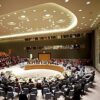Political Analysis | African Perceptions
Gabon’s Ministry of the Interior has announced that transitional president General Brice Oligui Nguema won the recent presidential election with a remarkable 90.35% of the vote. This landslide victory comes 19 months after the military coup that ended over five decades of Bongo family rule.
Results and Voter Turnout
Nguema secured 575,222 votes out of 610,747 ballots cast, reflecting a 70.4% turnout rate—higher than the contested 2023 elections. His closest challenger, former Prime Minister Alain-Claude Bilie-By-Nze, garnered just 3.2%, with the remaining votes split among six other candidates.

While the results suggest overwhelming support, they also raise concerns about the level of genuine electoral competition, particularly in the absence of extensive international monitoring.
From Coup Leader to Civilian President
Nguema first seized power in August 2023 following disputed elections under Ali Bongo. His transition from military leader to elected president with such a dominant margin raises questions about the independence of institutions and the transparency of the electoral process.
New Constitution, Same Power Structure?
In November 2024, Gabon adopted a new constitution via referendum, supported by 91% of voters. It limits presidential terms to seven years, renewable once. While some see this as a step toward reform, others fear it is a cosmetic change designed to entrench the existing regime.
International Reactions and Concerns
Organizations such as Human Rights Watch and Amnesty International have voiced concerns about restricted civil liberties and continued military influence. The African Union welcomed the elections but emphasized the need for genuine political openness and accountability.
A New Era or the Same Cycle?
Despite Nguema’s reformist rhetoric, Gabon’s democratic future hinges on his willingness to implement real political change, empower institutions, and prevent a return to authoritarian governance




























